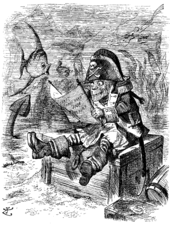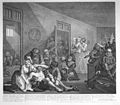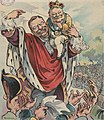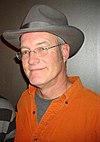The Cartoon Portal
A cartoon is a type of visual art that is typically drawn, frequently animated, in an unrealistic or semi-realistic style. The specific meaning has evolved, but the modern usage usually refers to either: an image or series of images intended for satire, caricature, or humor; or a motion picture that relies on a sequence of illustrations for its animation. Someone who creates cartoons in the first sense is called a cartoonist, and in the second sense they are usually called an animator.
The concept originated in the Middle Ages, and first described a preparatory drawing for a piece of art, such as a painting, fresco, tapestry, or stained glass window. In the 19th century, beginning in Punch magazine in 1843, cartoon came to refer – ironically at first – to humorous artworks in magazines and newspapers. Then it also was used for political cartoons and comic strips. When the medium developed, in the early 20th century, it began to refer to animated films that resembled print cartoons. (Full article...)

In print media, a cartoon is a drawing or series of drawings, usually humorous in intent. This usage dates from 1843, when Punch magazine applied the term to satirical drawings in its pages,[1] particularly sketches by John Leech.[2] The first of these parodied the preparatory cartoons for grand historical frescoes in the then-new Palace of Westminster in London.[3]

Selected article -
The Prince of Egypt is a 1998 American animated musical film and the first traditionally animated film produced and released by DreamWorks Animation. The film is an adaptation of the Book of Exodus and follows the life of Moses and from being prince of Egypt to his ultimate destiny to lead the Hebrew slaves out of Egypt. The film was directed by Brenda Chapman, Simon Wells and Steve Hickner. The film featured songs written by Stephen Schwartz and a score composed by Hans Zimmer. The voice cast featured a number of major Hollywood actors in the speaking roles, while professional singers replaced them for the songs. The exceptions were Michelle Pfeiffer, Ralph Fiennes, Ofra Haza, Steve Martin, and Martin Short, who sang their own parts. The film was nominated for best Original Music Score and won for Best Original Song at the 1999 Academy Awards for "When You Believe". The pop version of the song was performed at the ceremony by Whitney Houston and Mariah Carey. The song, co-written by Stephen Schwartz, Hans Zimmer and with additional production by Babyface, was nominated for Best Original Song (in a Motion Picture) at the 1999 Golden Globes, and was also nominated for Outstanding Performance of a Song for a Feature Film at the ALMA Awards. The film was released in theaters on December 18, 1998, and on home video on September 14, 1999. The film went on to gross $218,613,188 worldwide in theaters, making it the second traditionally animated feature not released by Disney to gross over $100 million in the U.S. after The Rugrats Movie. The film also remained the highest grossing non-Disney traditionally animated film until 2007, when it was out-grossed by The Simpsons Movie.
Selected character -
Bart Simpson is a fictional main character in the animated television series The Simpsons and part of the eponymous family. He is voiced by actress Nancy Cartwright and first appeared on television in The Tracey Ullman Show short "Good Night" on April 19, 1987. Bart was created and designed by cartoonist Matt Groening while he was waiting in the lobby of James L. Brooks' office. While the rest of the characters were named after Groening's family members, Bart's name was an anagram of the word brat. After appearing on The Tracey Ullman Show for three years, the Simpson family received their own series on Fox, which debuted December 17, 1989. He has appeared in other media relating to The Simpsons; including video games, The Simpsons Movie, The Simpsons Ride, commercials, and comic books; and inspired an entire line of merchandise. Hallmarks of the character include his chalkboard gags in the opening sequence; his prank calls to Moe the bartender; and his catchphrases "Eat my shorts", "¡Ay, caramba!", and "Don't have a cow, man!" Nancy Cartwright has won several awards for voicing Bart, including a Primetime Emmy Award in 1992 and an Annie Award in 1995. In 2000, Bart, along with the rest of his family, was awarded a star on the Hollywood Walk of Fame.
Did you know... -
- ...that William Hanna claimed that the Tom and Jerry character Jerry Mouse was named Jinx in his first appearance while Joseph Barbera claimed that the mouse went nameless?
- ...that the Simpsons short Good Night aired April 19, 1987 on The Tracey Ullman Show and was the first ever appearance of the Simpson family on television?
- ...that Morning Funnies was a fruit-flavored breakfast cereal featuring comic strip characters including Dennis the Menace, Hägar the Horrible, and Funky Winkerbean on the box?
- ...that Sozin's Comet: The Final Battle, the two-hour finale for Avatar: The Last Airbender, was the most-watched cable television broadcast in the week of its transmission?
Selected list -
The Primetime Emmy Award for Outstanding Voice-Over Performance is a creative arts Emmy Award given out by the Academy of Television Arts and Sciences. It is awarded to a performer for an outstanding "continuing or single voice-over performance in a series or a special." Prior to 1992, voice-actors could be nominated for their performance in the live action acting categories. The award was first given in 1992 when six voice actors from The Simpsons shared the award. From 1992 to 2008, it was a juried award, so there were no nominations and there would be multiple or no recipients in one year. In 2009, the rules were changed to a category award, with five nominees. No winner was named in 1996 or 2007. Nine voice actors from The Simpsons have won a combined 14 Emmys. Of those, Dan Castellaneta has won four and Hank Azaria has won three. Ja'net Dubois won two for The PJs and Keith David won two for his narration of various documentaries. Voice actors from shows on Fox have won 17 of 27 awards.
General images -
Selected biography -
Steve Ross Purcell is an American cartoonist, animator and game designer. He is most widely known as the creator of Sam & Max, an independent comic book series about a pair of anthropomorphic animal vigilantes and private investigators, for which Purcell received an Eisner Award in 2007. The series has since grown to incorporate an animated television series and several video games. A graduate of the California College of Arts and Craft, Purcell began his career creating comic strips for the college newsletter. He performed freelance work for Marvel Comics and Fishwrap Productions before publishing his first Sam & Max comic in 1987. Purcell was hired by LucasArts as an artist and animator in 1988, working on several titles within the company's adventure games era. Purcell collaborated with Nelvana to create a Sam & Max television series in 1997, and briefly worked as an animator for Industrial Light & Magic after leaving LucasArts. He is currently employed in the story development department at Pixar. His main work for the animation studio has been with the 2006 film Cars and spin-off materials such as shorts and video games. Despite his employment with Pixar, Purcell has continued to work with comic books and came together with Telltale Games in 2005 to bring about new series of Sam & Max video games.
Subcategories

WikiProjects
- Main projects
- Arts • Animation • Comics • Entertainment • Visual arts
- Related Projects
- Anime and manga • Biography • Film • Fictional characters • Media franchises • Music • Television • Video games
Selected quote -
Topics
- Comic book
- Comic strip
- Digital comics
- Graphic novel
- Mobile comic
- Motion comics
- Trade paperback
- Webcomic
- Animator
- Animation director
- Animation studios
- Animation film festivals
- Feature-length films
- Short films
- Television series
- Computer-animated films
- Stop-motion films
- Traditional animation
- Limited animation
- Rotoscoping
- Stop Motion
- Clay
- Cutout
- Graphic
- Model
- Object
- Pixilation
- Puppetoon
- Computer animation
- Flash animation
- PowerPoint animation
- SVG animation
- Cel-shaded animation
- Crowd simulation
- Morph target animation
- Motion capture
- Non-photorealistic rendering
- Skeletal animation
Things you can do

- Requested articles: Fenwick (comics), Khimaera (comics), Mutant Underground Support Engine, Bruce J. Hawker, Marc Dacier, Hultrasson, Frankenstein Comics, Dave Johnson (comics), Paco Medina, Dappere Dodo, New Adventures of the Space Explorers, Habatales, Musical Box, Foo-Foo (TV series), Bonne nuit les petits, The Adventures of Lariat Sam, More...
- Images and photos needed: Request images that are needed from Wikipedia requested images of comics and animation to included in each articles.
- Stubs: Work on stubs in articles in Comics and Animation stubs.
- Infobox: Add infobox that are needed from Category:Comics articles without infoboxes and Category:Animation articles needing infoboxes in articles.
- Deletion sorting: Please see the collection of discussions on the deletion of articles related to comics and animation - compiled by WikiProject Deletion sorting
Related portals
Associated Wikimedia
The following Wikimedia Foundation sister projects provide more on this subject:
-
Commons
Free media repository -
Wikibooks
Free textbooks and manuals -
Wikidata
Free knowledge base -
Wikinews
Free-content news -
Wikiquote
Collection of quotations -
Wikisource
Free-content library -
Wikiversity
Free learning tools -
Wiktionary
Dictionary and thesaurus
More portals
Sources
- ^ Punch.co.uk. "History of the Cartoon". Archived from the original on 2007-11-11. Retrieved 2007-11-01.
- ^ Adler & Hill 2008, p. 30.
- ^ "Substance and Shadow: Original Editorial Accompanying "Cartoon, No. I"". Victorian web.org. Retrieved 29 October 2023.
© MMXXIII Rich X Search. We shall prevail. All rights reserved. Rich X Search






































